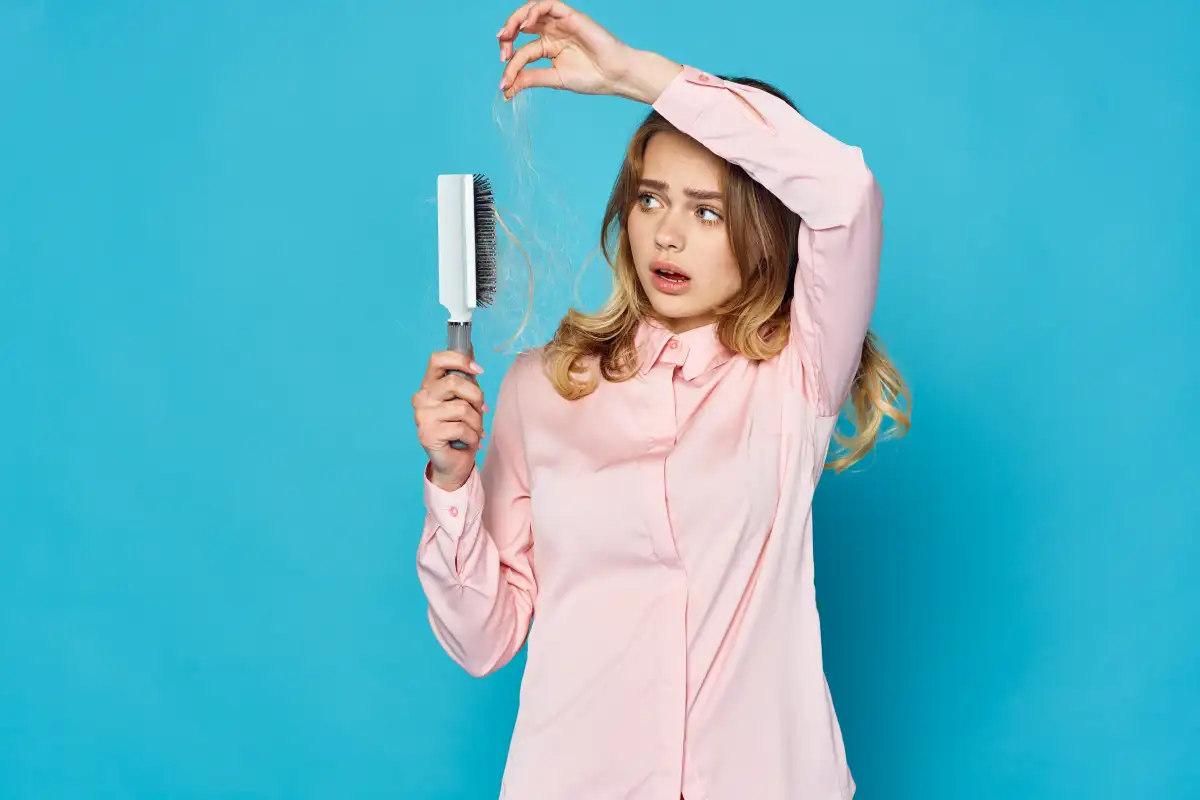Seasonal Hair Loss
The life cycle of hair consists of three phases: anagen (growth phase), catagen (transitional phase), and telogen (resting phase). After completing this cycle, hair falls out – this is a natural process. The normal daily hair loss is around 80–100 strands. If the loss exceeds this amount, it may indicate an internal health issue. However, there is one exception – periodic hair shedding during certain seasons. Let’s discuss this in more detail.
What is seasonal hair loss?
This term refers to a period when hair sheds more intensively than usual. It can occur in both women and men, although statistics show that women are more frequently affected.

In which seasons does it occur most often?
A healthy body typically "sheds" hair during seasonal transitions for about six to eight weeks. Certain deficiencies or illnesses may prolong this phase, while proper care and overall health improvements may reduce it.
It most commonly occurs in autumn and spring, during the body's natural adjustment to new conditions. If you notice excessive hair loss in summer or winter, it’s likely not seasonal hair loss – in such cases, a consultation with a trichologist is necessary.
How is seasonal hair loss different from other causes?
During seasonal hair loss, the number of hairs falling out increases, but the shedding is even and doesn’t affect the overall appearance of your hairstyle. There are no bald patches or visibly thinning areas.
In cases of hair loss caused by conditions like alopecia, hair falls out heavily in specific areas, leading to visible patches.
Hair affected by autoimmune diseases tends to differ from healthy hair – it appears thinner and weaker.
Why does seasonal hair loss occur?
- Deficiencies in iron, zinc, silicon, iodine, selenium, vitamins B7, C, and D, as well as Omega-3 fatty acids, can weaken hair and lead to shedding.
- Weakened immunity during seasonal changes – the body prioritizes vital organs, reducing support for hair follicles.
- Unbalanced nutrition – in spring, people tend to eat more fresh greens and early vegetables, often reducing protein intake.
- Cold-related illnesses – medications used for treatment may negatively affect hair health.
- UV damage – hair weakened by summer sun exposure may begin to shed rapidly in autumn.
Link to emotional and psychological state
- The start of the school year or return to work after a vacation, as well as winter preparation or holiday stress, can all trigger emotional strain. Stress causes the release of cortisol, which constricts blood vessels in the dermal papilla. As a result, hair follicles receive fewer nutrients, pushing hair into the telogen (resting) phase, eventually leading to shedding.
How to prepare for seasonal hair loss?
If you’ve experienced seasonal hair loss before, it’s best to prepare in advance. Preventative care is the most effective approach. Start in the summer:
- Wear a hat during long walks and at the beach.
- Use hair products with sun protection. Many professional formulas contain SPF to help maintain healthy hair.
- If you have hormonal imbalances or thyroid issues, consult a doctor in summer to stabilize your health.
- Ensure your diet is healthy and balanced. A trichologist can recommend the right supplements if necessary.
- Plan strengthening salon treatments for summer and use home care products to reduce shedding and promote growth. A trichologist can tailor a regimen to your needs.
- Taking care of your mental and physical health in summer can significantly reduce hair shedding in autumn.
How to care for hair during seasonal hair loss?
If you regularly care for your hair and scalp, seasonal hair loss shouldn’t be a concern. A little attention goes a long way in minimizing hair loss during this sensitive time. Here’s a year-round hair care routine to adopt:
- Proper cleansing. Always choose a shampoo that suits your hair type or addresses your concern. Use a scalp scrub at least once a month to stimulate hair growth.
- Hair Conditioner. A conditioner helps restore pH balance and seals the cuticle after washing. Apply it from mid-length to the ends.
- Nourishment. Hair masks provide intensive nourishment, repair, and strengthening through their concentrated formulas.
- Protection. Use sprays, oils, or leave-in products to protect hair. If you use hot styling tools, a heat protectant is a must.
- Gentle brushing. A poor-quality brush can damage hair regardless of the products used. Opt for professional tools with soft bristles.
What to do if seasonal hair loss has already started?
- Avoid aggressive coloring or chemical treatments during this time.
- Minimize the use of tight hair ties, ponytails, and clips.
- Add protein- and iron-rich foods to your diet – such as liver, eggs, lentils, and buckwheat.
- Use ampoules or serums with active ingredients like peptides, caffeine, and nettle extract.
Prevention of hair loss
To prevent seasonal hair loss, it’s important to take vitamin D (under medical supervision) and B-complex vitamins. Vitamins A, C, and E also support the hair growth cycle – their deficiency can result in brittle or thinning hair. Schedule regular medical check-ups and blood tests once a year.
A well-balanced diet including different meats, dairy, vegetables, fruits, oils, grains, and cereals ensures a sufficient supply of essential nutrients. If you’re following a weight loss or medically recommended diet, consult your doctor about taking additional supplements to avoid deficiencies.
When does seasonal hair loss become pathological?
Consult a doctor if you notice one or more of the following symptoms:
- Hair loss lasting more than two months.
- Visible bald patches or noticeably thinning areas.
- Severe scalp itching or inflammation.
- Loss of eyebrows or eyelashes.
Which doctor should you see for hair loss?

If you're experiencing hair loss, schedule an appointment with a trichologist. A trichologist specializes in the prevention, diagnosis, and treatment of hair and scalp conditions and can recommend at-home care to maintain the results of treatment.
A consultation may include discussing your symptoms (e.g., how long seasonal hair loss has lasted, the amount of hair lost), as well as a trichoscopy – a close examination of the scalp using a magnifying device. The doctor may also perform a pull test to assess shedding. Additional tests (e.g., blood work or other specialist referrals) may be recommended if needed.


